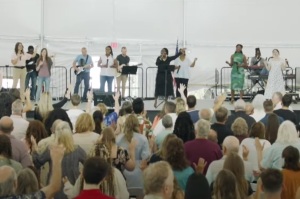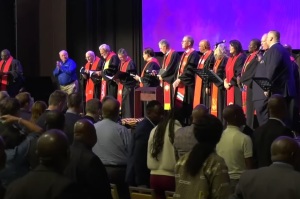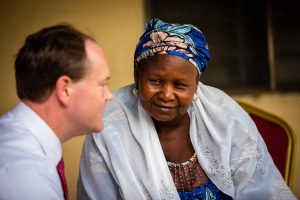A Look Back at SBC Conservative Resurgence
The Southern Baptist Convention, the largest protestant denomination in North America with more than 16 million members, has been known widely for its unequivocal evangelical voice and views in all arenas of Christianity. Oddly enough, just 25 years ago, the conservatives were actually a minority group in the denomination, with nearly all positions of authority held by moderates and liberals.
In the late 1970s two charismatic conservative leaders, Paige Patterson and Paul Pressler, came together and began planning a “fundamentalist takeover” of the SBC. As they planned, the fundamentalists won the 1979 presidency, and within 10 years, the entire bureaucracy of the SBC, including its seminaries, controlled by evangelicals. While liberals and the breakaway groups within the SBC criticized the movement as one driven by politics, fundamentalists steadfastly held that the resurgence followed the need to rededicate the denomination to God theologically.
On April 13, 2004, twenty-five years since the movement’s start, several panel members of the Southern Baptist Theological Seminary – the flagship seminary of the SBC – gathered for a commemorative symposium explaining the ‘true fuel’ that fired the resurgence.
“In the beginning, in the middle and in the end, the controversy in the Southern Baptist Convention was about theology,” said SBTS president Albert Mohler. “... Even when those who denied it was theological made their arguments most vociferously, they did so in theological terms.
“Undergirding every assertion, not only in the closet, but standing out in the forefront of every debate was theology. It is inescapably so because theology is the most fundamental issue of our knowledge, of our truth claims, of our thinking. It is the establishment of our worldview. ... Theology is the essence of the church.”
Mohler explained that as the Enlightenment ideology entered into the SBC seminaries, the inerrancy of the bible and fundamental teaching of the absolute authority of the Bible were challenged.
“For the first time Enlightenment ideologies and philosophies as a challenge to revelation itself came to Southern shores, to Southern states and into the bosom of the Southern Baptist Convention,” Mohler said.
“If you accept the fundamental naturalistic and secular assumptions of the Enlightenment, then you can no longer think of Scripture as the revealed Word of God, the Word of God written.
“Instead, you see the Scripture as eloquent, articulate, moving and even consensually important documents that reflect how human beings have apprehended the divine reality. But you can no longer say ‘as Scripture speaks, God speaks.’”
Therefore, there was a great need for a reformation and rededication of the denomination to the fundamental teachings of the bible.
“When the controversy began in 1979, one of the first responses ... was that people began to proclaim ... that inerrancy has never been a part of our Baptist heritage,” said Union University President David S. Dockery. “Yet a further reflection shows that not to be the case.”
Dockery went on to explain that in actuality, the historic view of the Baptists was that it “is logically impossible for the so-called truth of science or philosophy to conflict or contradict ... the truth of the Bible.”
“A theological understanding was lacking to examine and evaluate such issues. Even men and women who never questioned the reliability of the biblical message ... were confused by terms like ‘inerrant’ and ‘infallibility,’ which had been employed in previous generations.”
Even today, Dockery said, the evangelical Christians must continue to defend the traditional teachings of the bible, and reaffirm the absolute truth of the Bible.
“Southern Baptists cannot give up the affirmation of a totally true and trustworthy Bible because this foundational commitment serves all other essential affirmations of the Christian faith,” Dockery said. “A commitment to a completely truthful and fully authoritative Bible is the first step toward [awakening from] today’s theological and ethical trance that threatens the very heart of the Christian faith.”
According to Russell D. Moore, dean of SBTS’s School of Theology, the fundamentalists of today’s era must continue the fight, but make sure to keep in sight the main reason for the battle.
“There are real warnings that we must understand,” Moore said. “The intuitionism that Southern Baptists have expressed in the cultural arena must rest on a theology -- a theology of biblical authority, of conversion, of confessional integrity.
“We cannot be left on the fumes of a previous understanding of Scripture and of the faith once for all delivered to the saints. Where you do not have a bold and robust theology informing Great Commission passion, then so often, all you have left is politics. All you have left is a church that is indeed malleable by the culture ... Where there is no theological identity, there is a danger of becoming a constituency group.”
In addition to the speakers, Gregory A. Wills, associate professor of church history at Southern Seminary took part in the panel and directed the Center for the Study of the SBC, the symposium sponsor.





























